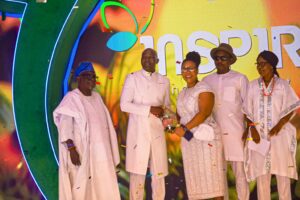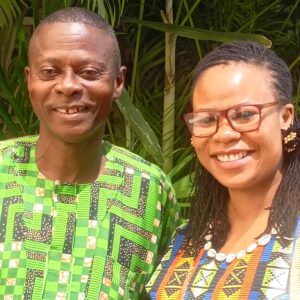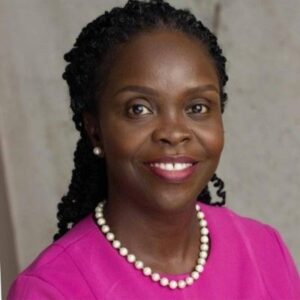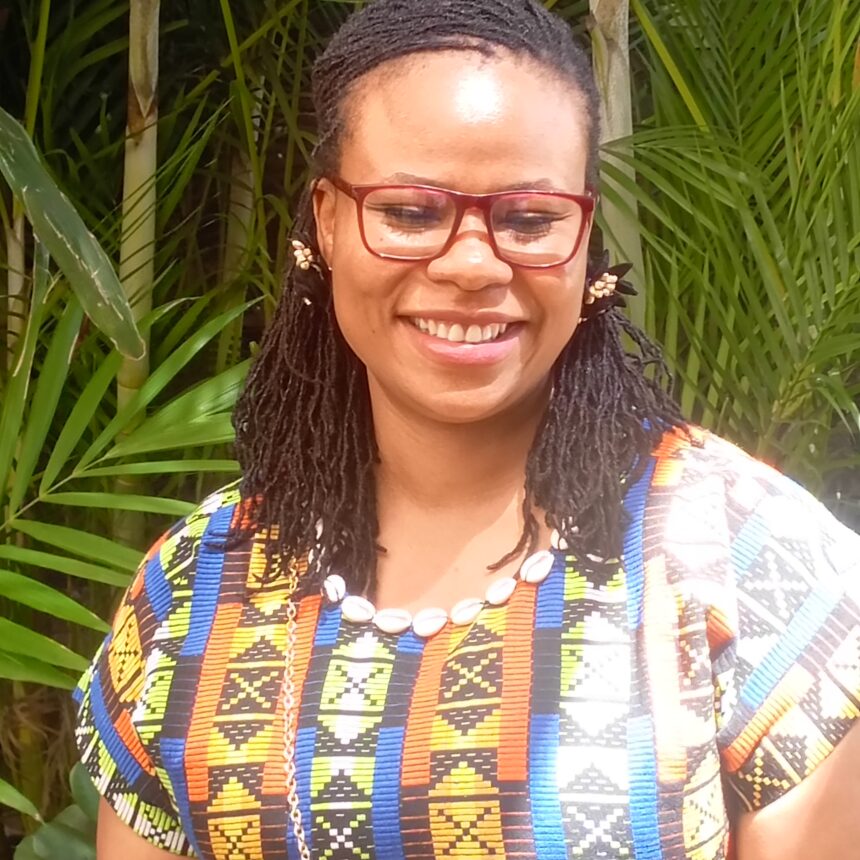Winner of the 2025 Nigeria Prize for Literature, Oyin Olugbile, speaks on the winning novel, SANYA, and her general literary journey, AKEEM LASISI writes
By Akeem Lasisi
Oyin Olugbile made more than history on October 10, 2025 when she emerged winner of the Nigerian Prize for Literature. Apart from earning the juicy $100,000 ever promptly redeemed by NLNG, founder and sponsor of the award, her name rang out as a debut novelist who proved that literary feats are not always about how long one has been in the trade as more seasoned authors also competed. Besides, her novel, SANYA, is a unique attempt at reconstructing Sango, Yoruba’s fiery deity whom she reproduces as a phenomenal woman.
She is not out to pamper any conventional feminist with the gut. Yet, the literary rebellion she launched means that she has some explanation to make and she engagingly told the stories behind her book last Thursday at a session with journalists at Sheraton Hotel, Ikeja, Lagos.

The relatively young author, who defied motherhood challenges to achieve the feat — she is a mother of five and a nursing one when writing SANYA — demonstrated what can be called another talent at the session: ability to defend one’s defiance. According to her, the idea for the book came from her personal research into Yoruba history. Something had told her there was a missing link in the profile normally ascribed to Sango, the god of thunder who was also an Alaafin of Oyo in the old Oyo Empire. “Some things just did not add up for me. I immersed myself into research and I was neck deep in it for months,” she said.
The turning point came when she, according to her, discovered gaps that had gone unquestioned for generations. She found contradictions in Sango’s story of power, exile and betrayal. Her research led her to Ajaka, Sango’s elder brother, who was also known as Dada.
She explained, “A lot of people don’t know that the Dada in the saying Dada o le ja, sugbon o laburo to gboju’ is actually Sango’s brother, Ajaka. He was a very weak king.” The proverb roughly translates as although Dada is not strong enough for a fight, he has an indomitable younger brother.
That weakness, she said, forced the Oyo people to turn to Sango for leadership, a move that sparked deep rivalry within the royal family. Olugbile noted that betrayal played a key role in Sango’s story, adding, “If Sango was betrayed, the betrayal must have come from someone close.”
She said it was at this point she began to question what she believes history had failed to reveal. “Could it be that there would have actually been a woman king at some point, and because of that same norm that forbids it, identity was kept hidden?” She had asked herself.


An Ibadan, Oyo State-born daughter of a broadcaster father, Olugbile mingled with dramatists and other media/culture workers very early in life. The Sheraton session, indeed, reunited her with one of her father’s former colleagues, Tony Okuyeme, whom she used to see at Nigerian Television Authority (NTA) Ibadan. She and Okuyeme, now the Arts Editor at New Telegraph, endlessly swam in nostalgia at the event. She, however, recalled that she studied Theatre Arts at the University of Lagos, where she encountered Yoruba mythological stories of Sango, Oya and Ogun. That background helped shape her understanding of Yoruba cosmology and storytelling.
She stressed that SANYA challenges silence around women and power and offers what she called “an alternative way of seeing history.” Yet, she dismissed the fear or any claim that the novel is an attack on Yoruba culture. She said, “I am quite rebellious, but I did not write this to insult tradition. Let the controversy come so that something can change.”
On whether the story is feminist, she believes it depends on how feminism is defined. She does not align with anti-male feminism but the one that inspires society to continually redefine itself for progress, justice and other related values. “For me, feminism is giving a voice to a gender without putting the other gender down,” she stated, adding her goal was balance, not a gender war.
Olugbile revealed that her writing journey and process were powered by determination, discipline connection to a good editor and the exploitation of the pragmatism that technology offers. SANYA’s first draft was rejected by a publishing house but she refused to abandon the project. Rather, she restructured the manuscript, working with the editor to refine the piece that eventually became the crowned jewel at the Nigerian Prize for Literature. Surprisingly, she did not write the book on a laptop. “Fun fact: I never sat down to write on a laptop. I worked on my phone. I scribbled ideas everywhere and merged them later,” she said.
While noting that plans were underway to adapt SANYA into a film, she said that was on the condition that it (movie) must be standard. She insisted that African stories deserved global cinematic quality and added she would only accept a production that respects the depth of the story.
Olugbile yet has a message for culture stakeholders on the need to encourage a more honest approach to history: “We can be curious,” she said. “In respect to culture and tradition, we can still ask questions.”
SANYA beat This Motherless Land by Nikki May and The Road to The Country by Chigozie Obioma to win the award, with the judges saying all were quality novels.Chaired by Professor Akachi Adimora-Ezeigbo, the judges were Associate Professor Saeedat Bolajoko Aliyu of Kwara State University, Professor Stephen Mbanefo Ogene from Nnamdi Azikiwe University, and Mr. Olakunle Kasumu, a writer and host of Channels Television’s Book Club.
They have beautiful words for the winner: “Oyin Olugbile’s Sanya is an enchanting piece of literary work in many regards, particularly in its unorthodox depiction of Yoruba mythology, fantasy, culture and spirituality. From a plot perspective, Sanya is dynamic and multi-layered. In Yoruba mythology, Sango is an Orisa and a force of nature associated with a cult and a priesthood and referred to as the god of thunder, lightning, fire, virility, dance, and justice. The ancestral Sango was the fourth king of the town of Oyo who was described as powerful, with a voice like thunder and a mouth that spewed fire when he spoke. Oyin Olugbile’s Sanya is a bold retelling of the Sango mythology and legend.

“In the book, Sanya, the protagonist, is cast as a female with Sango’s gifts and characteristics. She had been prophesied before her birth to become a mighty warrior and leader whose life would have an unprecedented impact on her world. Still, those who received the prophecy – Ajoke and Aganju, her parents – never imagined the foretold warrior king would be a girl. Olugbile then adds a spin to the Sanya story with a major character who would later determine the destiny of Sanya: her brother, Dada. Dada is born physically weak but with high intelligence and the gift of seeing into the future. In a world of Orisas, gods, and sorcerers, Olugbile’s familial theme is manifested in the plots and subplots that take the reader along the life paths walked by these siblings, paths that lead them to a heartbreaking end.”
It was also an afternoon for stakeholders at the Sheraton conversation to appreciate the contributions of NLNG to the development of Nigerian literature. For two decades, the company has sponsored the mega prize and is not getting tired at all, unlike many other outfits who intervened in the sector but did not endure. Interestingly, Manager, Corporate Communications and Public Affairs atNLNG, Anne-Marie Palmer-Ikuku, announced in the course of the interview with Olugbile that the company is launching another award for documentary films. The cash prize? $20,000!



